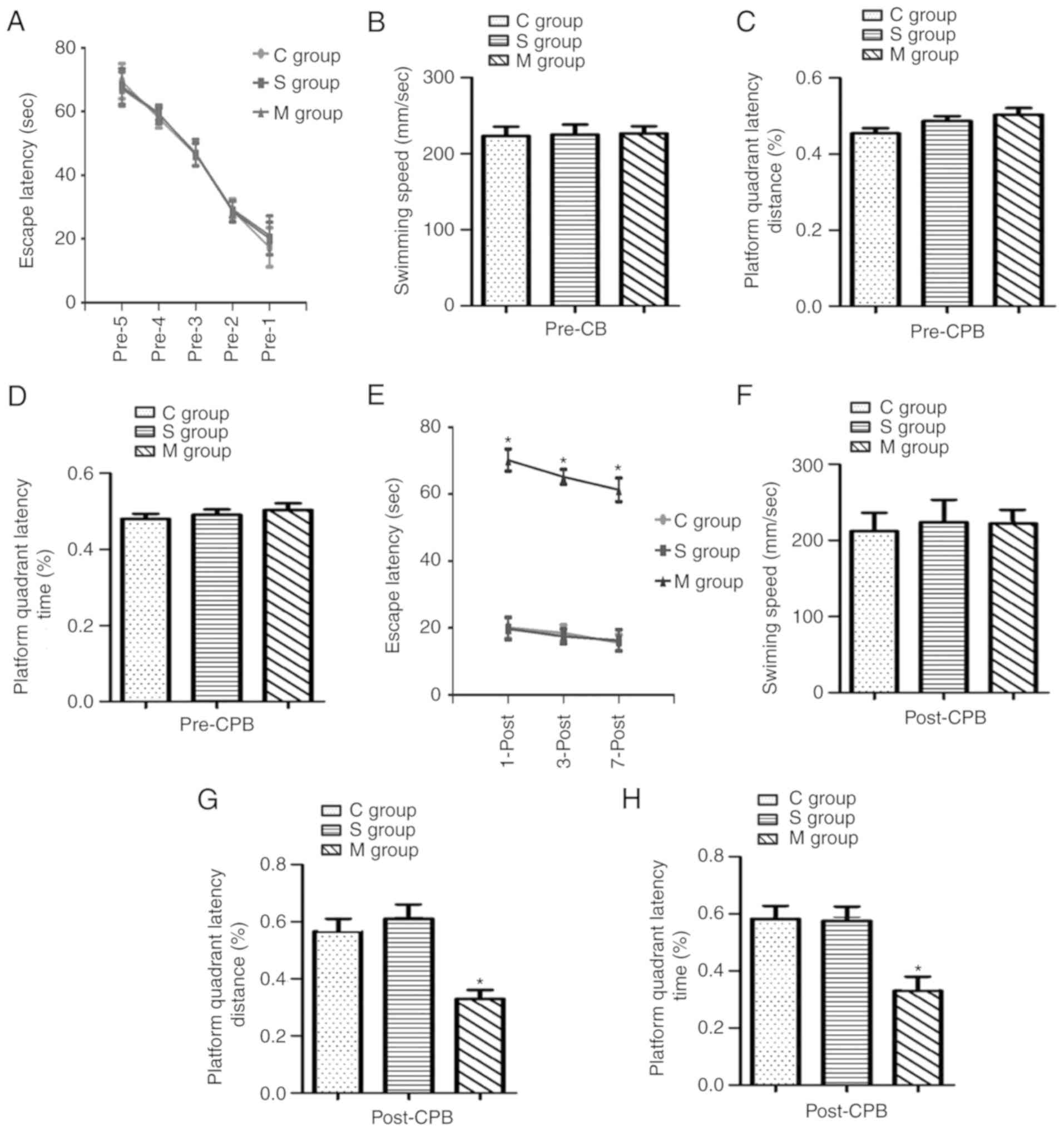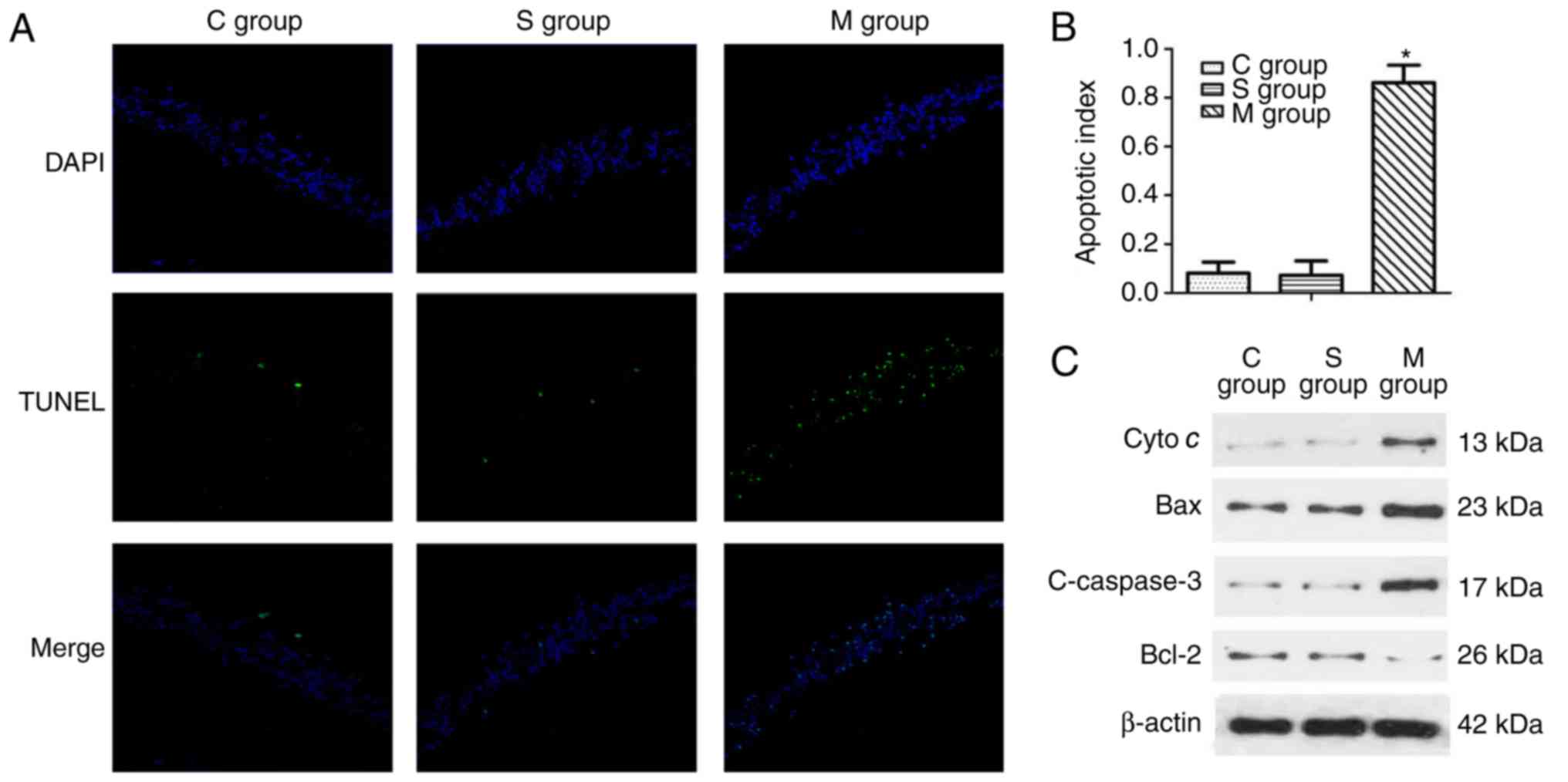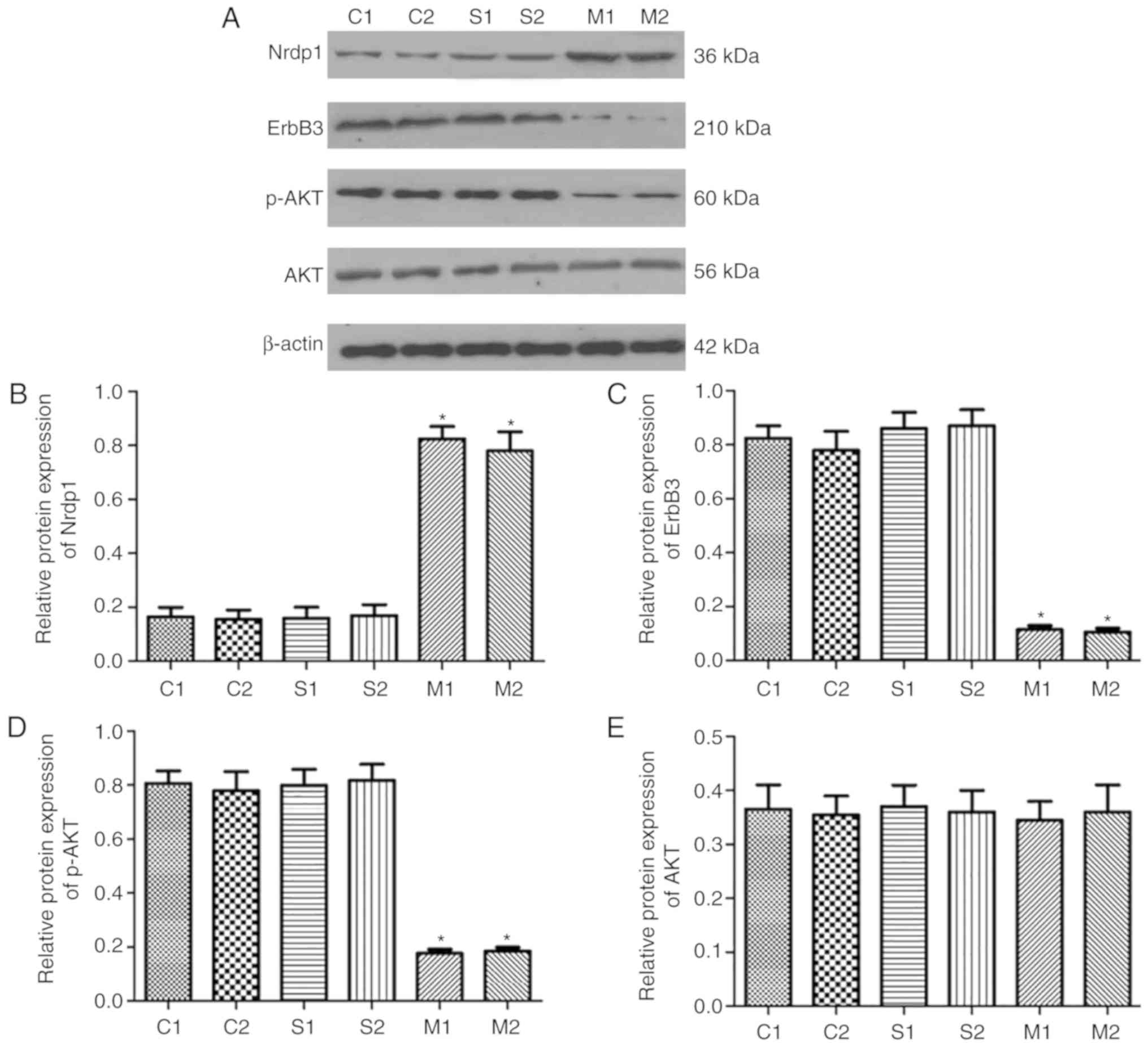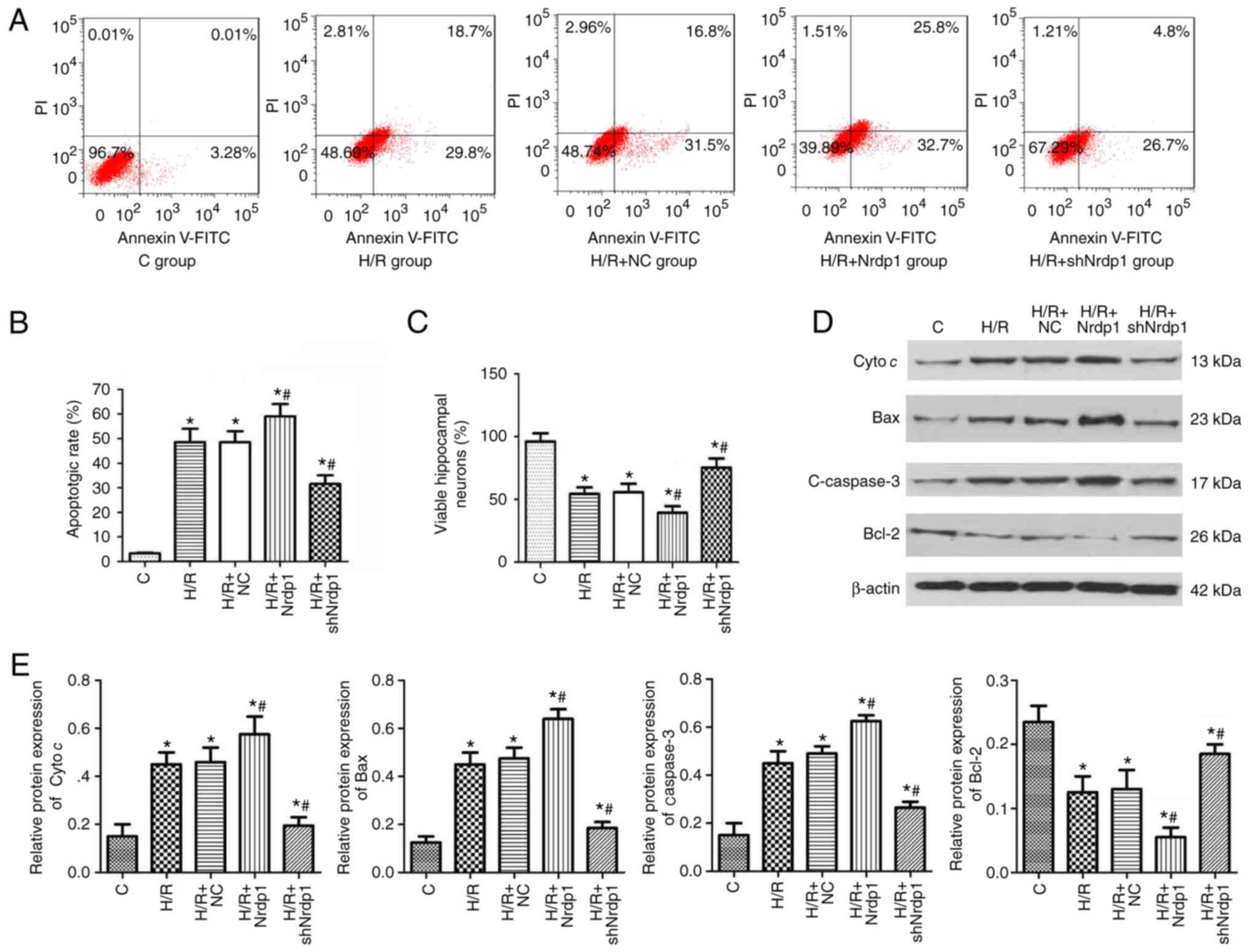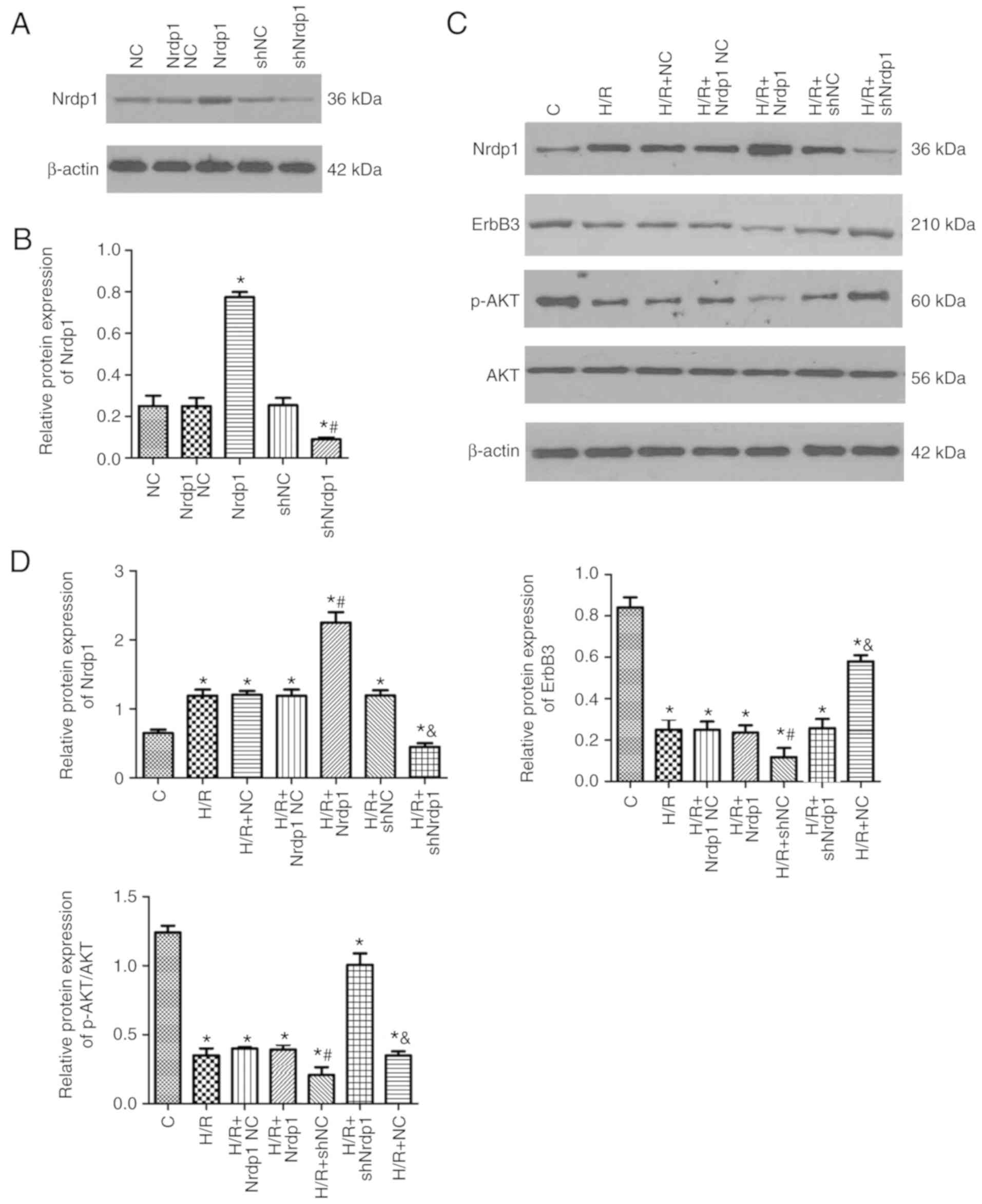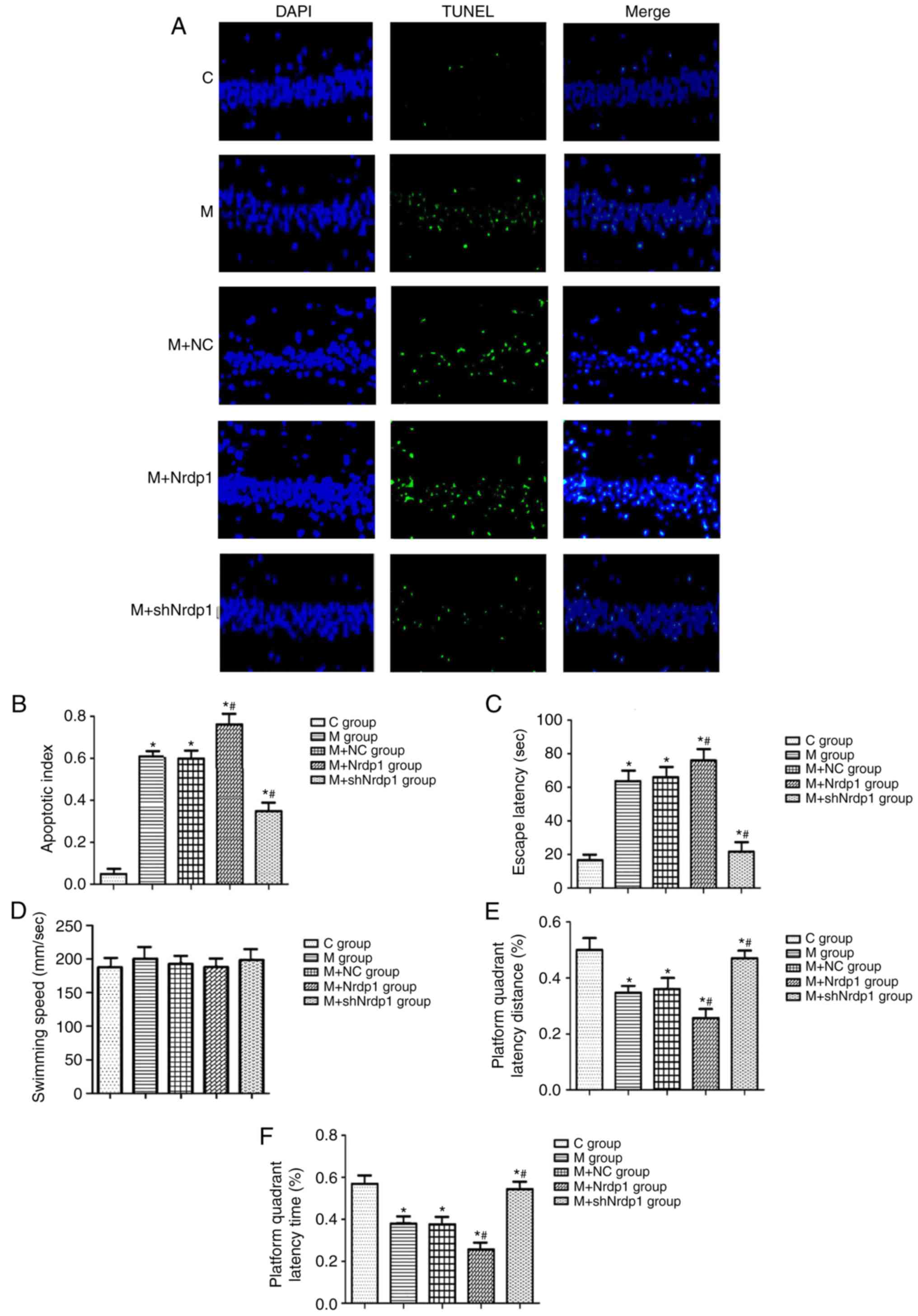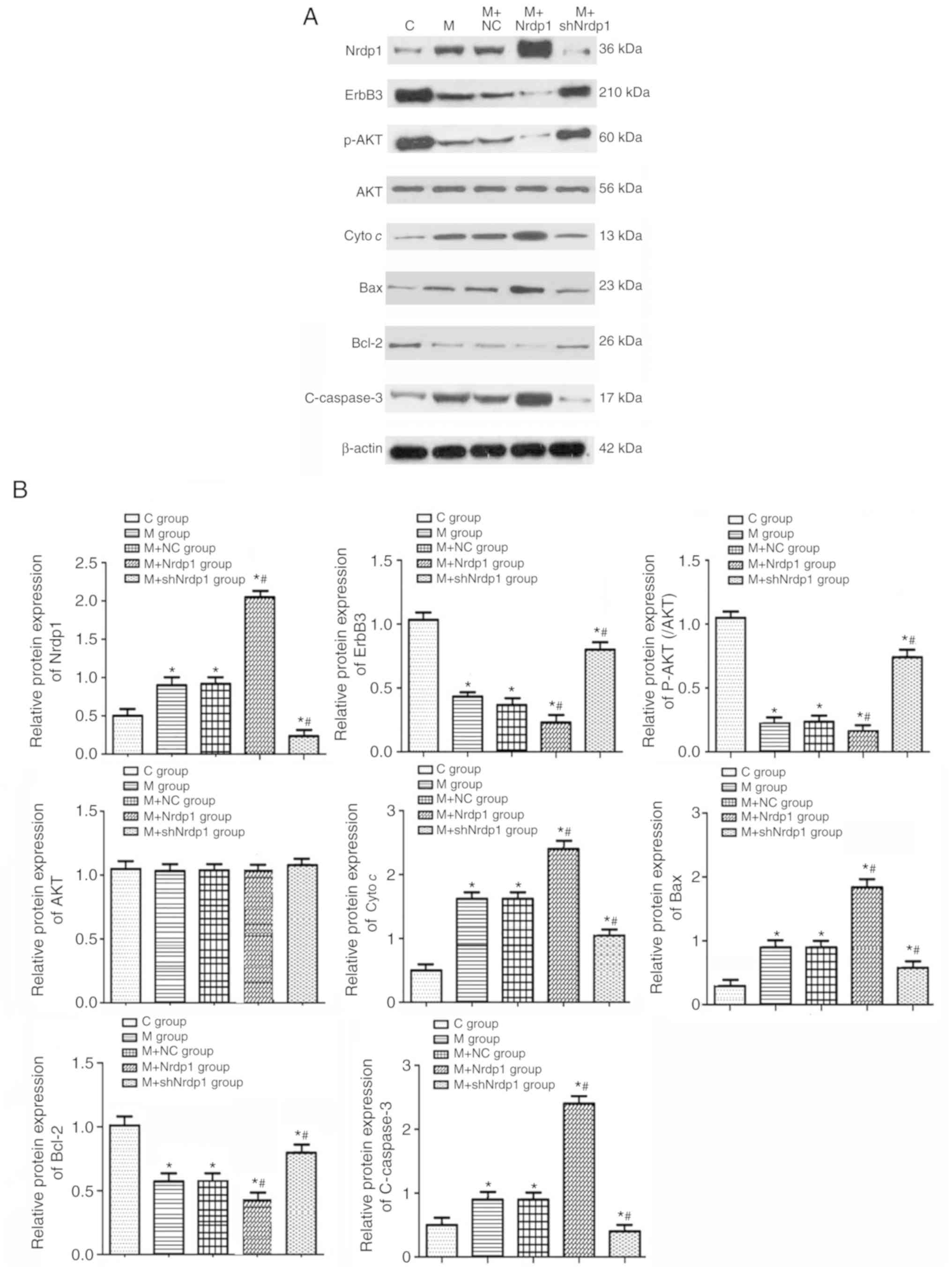|
1
|
Benson RA, Ozdemir BA, Matthews D and
Loftus IM: A systematic review of postoperative cognitive decline
following open and endovascular aortic aneurysm surgery. Ann R Coll
Surg Engl. 99:97–100. 2017. View Article : Google Scholar :
|
|
2
|
Bilotta F, Qeva E and Matot I: Anesthesia
and cognitive disorders: A systematic review of the clinical
evidence. Expert Rev Neurother. 16:1311–1320. 2016. View Article : Google Scholar : PubMed/NCBI
|
|
3
|
Funder KS, Steinmetz J and Rasmussen LS:
Cognitive dysfunction after cardiovascular surgery. Minerva
Anestesiol. 75:329–332. 2009.PubMed/NCBI
|
|
4
|
Liu C and Han JG: Advances in the
mechanisms and early warning indicators of the postoperative
cognitive dysfunction after the extracorporeal circulation.
Zhongguo Yi Xue Ke Xue Yuan Xue Bao. 37:101–107. 2015.PubMed/NCBI
|
|
5
|
Newman MF, Kirchner JL, Phillips-Bute B,
Gaver V, Grocott H, Jones RH, Mark DB, Reves JG and Blumenthal JA;
Neurological Outcome Research Group and the Cardiothoracic
Anesthesiology Research Endeavors Investigators: Longitudinal
assessment of neurocognitive function after coronary-artery bypass
surgery. N Engl J Med. 344:395–402. 2001. View Article : Google Scholar : PubMed/NCBI
|
|
6
|
Steinmetz J, Christensen KB, Lund T, Lohse
N and Rasmussen LS; ISPOCD Group: Long-term consequences of
postoperative cognitive dysfunction. Anesthesiology. 110:548–555.
2009. View Article : Google Scholar : PubMed/NCBI
|
|
7
|
Qian XL, Zhang W, Liu MZ, Zhou YB, Zhang
JM, Han L, Peng YM, Jiang JH and Wang QD: Dexmedetomidine improves
early postoperative cognitive dysfunction in aged mice. Eur J
Pharmacol. 746:206–212. 2015. View Article : Google Scholar
|
|
8
|
Zhang X, Dong H, Li N, Zhang S, Sun J,
Zhang S and Qian Y: Activated brain mast cells contribute to
postoperative cognitive dysfunction by evoking microglia activation
and neuronal apoptosis. J Neuroinflammation. 13:1272016. View Article : Google Scholar : PubMed/NCBI
|
|
9
|
Gong B, Radulovic M, Figueiredo-Pereira ME
and Cardozo C: The ubiquitin-proteasome system: Potential
therapeutic targets for Alzheimer’s disease and spinal cord injury.
Front Mol Neurosci. 9:42016. View Article : Google Scholar
|
|
10
|
Lip PZ, Demasi M and Bonatto D: The role
of the ubiquitin proteasome system in the memory process. Neurochem
Int. 102:57–65. 2017. View Article : Google Scholar
|
|
11
|
Diamonti AJ, Guy PM, Ivanof C, Wong K,
Sweeney C and Carraway KL III: An RBCC protein implicated in
maintenance of steady-state neuregulin receptor levels. Proc Natl
Acad Sci USA. 99:2866–2871. 2002. View Article : Google Scholar : PubMed/NCBI
|
|
12
|
Wang C, Chen T, Zhang J, Yang M, Li N, Xu
X and Cao X: The E3 ubiquitin ligase Nrdp1 ‘preferentially’
promotes TLR-mediated production of type I interferon. Nat Immunol.
10:744–752. 2009. View
Article : Google Scholar : PubMed/NCBI
|
|
13
|
Mahar I, MacIsaac A, Kim JJ, Qiang C,
Davoli MA, Turecki G and Mechawar N: Effects of neuregulin-1
administration on neurogenesis in the adult mouse hippocampus, and
characterization of immature neurons along the septotemporal axis.
Sci Rep. 6:304672016. View Article : Google Scholar : PubMed/NCBI
|
|
14
|
Mahar I, Labonte B, Yogendran S, Isingrini
E, Perret L, Davoli MA, Rachalski A, Giros B, Turecki G and
Mechawar N: Disrupted hippocampal neuregulin-1/ErbB3 signaling and
dentate gyrus granule cell alterations in suicide. Transl
Psychiatry. 7:e11612017. View Article : Google Scholar : PubMed/NCBI
|
|
15
|
Thompson M, Lauderdale S, Webster MJ,
Chong VZ, McClintock B, Saunders R and Weickert CS: Widespread
expression of ErbB2, ErbB3 and ErbB4 in non-human primate brain.
Brain Res. 1139:95–109. 2007. View Article : Google Scholar : PubMed/NCBI
|
|
16
|
Shen Y, Qin H, Chen J, Mou L, He Y, Yan Y,
Zhou H, Lv Y, Chen Z, Wang J, et al: Postnatal activation of TLR4
in astrocytes promotes excitatory synaptogenesis in hippocampal
neurons. J Cell Biol. 215:719–734. 2016. View Article : Google Scholar : PubMed/NCBI
|
|
17
|
Lee GM, Welsby IJ, Phillips-Bute B, Ortel
TL and Arepally GM: High incidence of antibodies to protamine and
protamine/heparin complexes in patients undergoing cardiopulmonary
bypass. Blood. 121:2828–2835. 2013. View Article : Google Scholar : PubMed/NCBI
|
|
18
|
Qian Wu QF, Zhao C, Dong N, Li Q, Wang J,
Chen BB, Yu L, Han L, Du YM B, et al: Activation of transient
receptor potential vanilloid 4 involves in hypoxia/reoxygenation
injury in cardio-myocytes. Cell Death Dis. 8:e28282017. View Article : Google Scholar
|
|
19
|
Qi Z, Tianbao Y, Yanan L, Xi X, Jinhua H
and Qiujun W: Pre-treatment with nimodipine and 7.5% hypertonic
saline protects aged rats against postoperative cognitive
dysfunction via inhibiting hippocampal neuronal apoptosis. Behav
Brain Res. 321:1–7. 2017. View Article : Google Scholar
|
|
20
|
Tian A, Ma H, Zhang R, Cui Y and Wan C:
Edaravone improves spatial memory and modulates endoplasmic
reticulum stress-mediated apoptosis after abdominal surgery in
mice. Exp Ther Med. 14:355–360. 2017. View Article : Google Scholar : PubMed/NCBI
|
|
21
|
Ho N, Sommers MS and Lucki I: Effects of
diabetes on hippocampal neurogenesis: Links to cognition and
depression. Neurosci Biobehav Rev. 37:1346–1362. 2013. View Article : Google Scholar : PubMed/NCBI
|
|
22
|
Zhao C, Deng W and Gage FH: Mechanisms and
functional implications of adult neurogenesis. Cell. 132:645–660.
2008. View Article : Google Scholar : PubMed/NCBI
|
|
23
|
Machado VM, Lourenco AS, Florindo C,
Fernandes R, Carvalho CM and Araujo IM: Calpastatin overexpression
preserves cognitive function following seizures, while maintaining
post-injury neurogenesis. Front Mol Neurosci. 10:602017. View Article : Google Scholar : PubMed/NCBI
|
|
24
|
Dong RF, Zhang B, Tai LW, Liu HM, Shi FK
and Liu NN: The neuroprotective role of miR-124-3p in a
6-hydroxy-dopamine-induced cell model of parkinson’s disease via
the regulation of ANAX5. J Cell Biochem. 119:269–277. 2018.
View Article : Google Scholar
|
|
25
|
Malik B, Currais A and Soriano S: Cell
cycle-driven neuronal apoptosis specifically linked to amyloid
peptide Aβ1-42 exposure is not exacerbated in a mouse model of
presenilin-1 familial Alzheimer’s disease. J Neurochem.
106:912–916. 2008. View Article : Google Scholar : PubMed/NCBI
|
|
26
|
Xing HY, Li B, Peng D, Wang CY, Wang GY,
Li P, Le YY, Wang JM, Ye G and Chen JH: A novel monoclonal antibody
against the N-terminus of Aβ1–42 reduces plaques and improves
cognition in a mouse model of Alzheimer’s disease. PLoS One.
12:e1800762017. View Article : Google Scholar
|
|
27
|
Cordeiro MF, Normando EM, Cardoso MJ,
Miodragovic S, Jeylani S, Davis BM, Guo L, Ourselin S, A’Hern R and
Bloom PA: Real-time imaging of single neuronal cell apoptosis in
patients with glaucoma. Brain. 140:1757–1767. 2017. View Article : Google Scholar : PubMed/NCBI
|
|
28
|
Li H, Saucedo-Cuevas L, Shresta S and
Gleeson JG: The neurobiology of zika virus. Neuron. 92:949–958.
2016. View Article : Google Scholar : PubMed/NCBI
|
|
29
|
Schallner N, Pandit R, LeBlanc R III,
Thomas AJ, Ogilvy CS, Zuckerbraun BS, Gallo D, Otterbein LE and
Hanafy KA: Microglia regulate blood clearance in subarachnoid
hemorrhage by heme oxygenase-1. J Clin Invest. 125:2609–2625. 2015.
View Article : Google Scholar : PubMed/NCBI
|
|
30
|
Gao J, Chen C, Liu Y, Li Y, Long Z, Wang
H, Zhang Y, Sui J, Wu Y, Liu L, et al: Lycium barbarum
polysaccharide improves traumatic cognition via reversing imbalance
of apoptosis/regeneration in hippocampal neurons after stress. Life
Sci. 121:124–134. 2015. View Article : Google Scholar
|
|
31
|
Xiong B, Shi Q and Fang H: Dexmedetomidine
alleviates postoperative cognitive dysfunction by inhibiting neuron
excitation in aged rats. Am J Transl Res. 8:70–80. 2016.PubMed/NCBI
|
|
32
|
Hamburger AW: The role of ErbB3 and its
binding partners in breast cancer progression and resistance to
hormone and tyrosine kinase directed therapies. J Mammary Gland
Biol Neoplasia. 13:225–233. 2008. View Article : Google Scholar : PubMed/NCBI
|
|
33
|
Shi H, Gong H, Cao K, Zou S, Zhu B, Bao H,
Wu Y, Gao Y, Tang Y and Yu R: Nrdp1-mediated ErbB3 degradation
inhibits glioma cell migration and invasion by reducing cytoplasmic
localization of p27Kip1. J Neurooncol. 124:357–364.
2015. View Article : Google Scholar : PubMed/NCBI
|
|
34
|
Wu Y, Wang L, Bao H, Zou S, Fu C, Gong H,
Gao Y, Tang Y, Yu R and Shi H: Nrdp1S, short variant of Nrdp1,
inhibits human glioma progression by increasing Nrdp1-mediated
ErbB3 ubiquitination and degradation. J Cell Mol Med. 20:422–429.
2016. View Article : Google Scholar
|
|
35
|
Zhang Y, Zeng Y, Wang M, Tian C, Ma X,
Chen H, Fang Q, Jia L, Du J and Li H: Cardiac-specific
overexpression of E3 ligase Nrdp1 increases ischemia and
reperfusion-induced cardiac injury. Basic Res Cardiol. 106:371–383.
2011. View Article : Google Scholar : PubMed/NCBI
|
|
36
|
Zhang Y, Yang K, Wang T, Li W, Jin X and
Liu W: Nrdp1 increases ischemia induced primary rat cerebral
cortical neurons and pheochromocytoma cells apoptosis via
downregulation of HIF-1α protein. Front Cell Neurosci. 11:2932017.
View Article : Google Scholar
|
|
37
|
Shen J, Song Y, Lin Y, Wu X, Yan Y, Niu M,
Zhou L, Huang Y, Gao Y and Liu Y: Nrdp1 is associated with neuronal
apoptosis in lipopolysaccharide-induced neuroinflammation.
Neurochem Res. 40:971–979. 2015. View Article : Google Scholar : PubMed/NCBI
|















